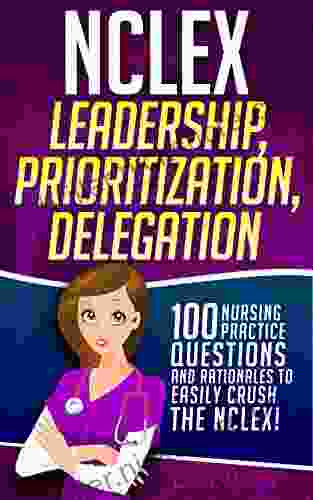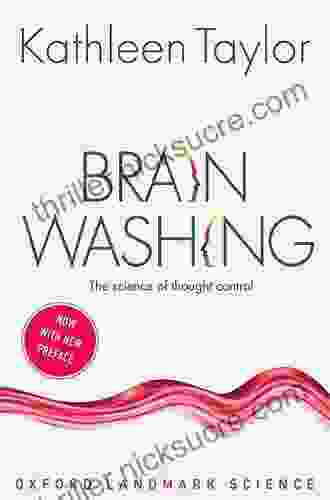The Science of Thought Control: Oxford Landmark Science

Thought control is a controversial topic that has been explored in science fiction for centuries. But what is the science behind thought control? What are the potential risks and benefits? And how close are we to developing real-world thought control technologies?
In this article, we will explore the science of thought control, from its history to its potential future applications. We will also discuss the ethical concerns that surround thought control and consider the implications of this technology for our society.
4.1 out of 5
| Language | : | English |
| File size | : | 5503 KB |
| Screen Reader | : | Supported |
| Print length | : | 544 pages |
| Lending | : | Enabled |
What is Thought Control?
Thought control is the ability to influence or control another person's thoughts, feelings, or behavior. This can be done through a variety of methods, including:
- Persuasion: Using words or actions to convince someone to change their beliefs or behavior.
- Coercion: Using threats or force to make someone do something against their will.
- Manipulation: Using deception or trickery to get someone to do something they would not otherwise do.
- Brainwashing: Using psychological techniques to systematically change someone's beliefs and behavior.
Thought control can be used for a variety of purposes, both good and bad. For example, thought control could be used to help people overcome addictions, phobias, or other mental health problems. It could also be used to influence people's political beliefs or to make them more compliant with authority.
However, thought control also has the potential to be used for evil. For example, thought control could be used to create a totalitarian state in which people's thoughts and actions are controlled by the government. It could also be used to torture people or to extract information from them against their will.
The History of Thought Control
The history of thought control goes back to the earliest days of human civilization. In ancient times, shamans and priests used various methods to influence the thoughts and behavior of their followers. In the Middle Ages, the Catholic Church used torture and other forms of coercion to suppress heresy.
In the 20th century, thought control techniques were developed and refined by governments and intelligence agencies around the world. These techniques were used to extract information from prisoners, to torture political dissidents, and to brainwash people into becoming spies or assassins.
Today, thought control techniques are still being used by governments and intelligence agencies. However, they are also being used by corporations and other organizations to influence people's behavior. For example, marketing companies use advertising and other forms of persuasion to convince people to buy their products. Political parties use propaganda to influence people's political beliefs.
The Science of Thought Control
The science of thought control is a complex and rapidly evolving field. Neuroscientists are using brain imaging techniques to study how the brain processes thoughts and emotions. Psychologists are developing new techniques for persuading and influencing people. And computer scientists are developing artificial intelligence (AI) systems that can learn how to influence human behavior.
One of the most important discoveries in the science of thought control is that the brain is not a passive organ that simply receives and processes information. Rather, the brain is an active organ that constantly interprets and shapes our experiences. This means that our thoughts and feelings are not simply the result of external stimuli. They are also the result of our own internal processes.
This discovery has led to the development of new thought control techniques that target the brain's own internal processes. For example, researchers have developed techniques that use electrical stimulation or magnetic pulses to influence brain activity. These techniques have been shown to be effective in treating a variety of mental health problems, such as depression, anxiety, and addiction.
Another important discovery in the science of thought control is that the brain is highly malleable. This means that our thoughts and feelings can be changed through experience. For example, people who are exposed to violence or trauma can develop PTSD. People who are exposed to positive experiences can develop resilience. And people who are exposed to new ideas can change their beliefs.
This discovery has led to the development of new thought control techniques that use experience to change people's thoughts and feelings. For example, therapists use cognitive-behavioral therapy (CBT) to help people change their negative thoughts and behaviors. And educators use positive reinforcement to help children learn new skills and develop positive attitudes.
The Potential Risks and Benefits of Thought Control
Thought control has the potential to be used for both good and evil. It could be used to help people overcome mental health problems, to influence people's political beliefs, or to make them more compliant with authority. However, it could also be used to create a totalitarian state in which people's thoughts and actions are controlled by the government. It could also be used to torture people or to extract information from them against their will.
The potential risks and benefits of thought control must be carefully weighed before using this technology. It is important to consider the potential benefits of thought control, such as its potential to help people overcome mental health problems. However, it is also important to consider the potential risks of thought control, such as its potential to be used for evil.
The Future of Thought Control
The science of thought control is rapidly evolving. New technologies are being developed that have the potential to make thought control more effective and more accessible. For example, AI systems are being developed that can learn how to influence human behavior. These systems could be used to create personalized thought control programs that are tailored to each individual's needs.
The future of thought control is uncertain. However, it is clear that this technology has the potential to be used for both good and evil. It is important to carefully consider the potential risks and benefits of thought control before using this technology. It is also important to develop ethical guidelines for the use of thought control technology.
Thought control is a controversial topic that raises a number of ethical concerns. However, it is also a powerful technology that has the potential to be used for good. It is important to carefully consider the potential risks and benefits of thought control before using this technology. It is also important to develop ethical guidelines for the use of thought control technology.
4.1 out of 5
| Language | : | English |
| File size | : | 5503 KB |
| Screen Reader | : | Supported |
| Print length | : | 544 pages |
| Lending | : | Enabled |
Do you want to contribute by writing guest posts on this blog?
Please contact us and send us a resume of previous articles that you have written.
 Fiction
Fiction Non Fiction
Non Fiction Romance
Romance Mystery
Mystery Thriller
Thriller SciFi
SciFi Fantasy
Fantasy Horror
Horror Biography
Biography Selfhelp
Selfhelp Business
Business History
History Classics
Classics Poetry
Poetry Childrens
Childrens Young Adult
Young Adult Educational
Educational Cooking
Cooking Travel
Travel Lifestyle
Lifestyle Spirituality
Spirituality Health
Health Fitness
Fitness Technology
Technology Science
Science Arts
Arts Crafts
Crafts DIY
DIY Gardening
Gardening Petcare
Petcare Christopher Clarey
Christopher Clarey Emil Frlez
Emil Frlez Genevieve Bardwell
Genevieve Bardwell Jd Tanner
Jd Tanner Julie Cangialosi
Julie Cangialosi Florence Weiser
Florence Weiser Sam Sorbo
Sam Sorbo John Moren
John Moren Susan F Paterno
Susan F Paterno Brian Herne
Brian Herne Elizabeth Davis
Elizabeth Davis Khalid Khashoggi
Khalid Khashoggi Martin A Lee
Martin A Lee Melanie Challenger
Melanie Challenger Hiram Bingham
Hiram Bingham Rachel Love Nuwer
Rachel Love Nuwer Sandra M Nettina
Sandra M Nettina Eric R Dodge
Eric R Dodge Kusha Karvandi
Kusha Karvandi Matthew Desmond
Matthew Desmond Jonathan H Turner
Jonathan H Turner Kathleen Cushman
Kathleen Cushman Kent Hoffman
Kent Hoffman Nick Heil
Nick Heil Jason Brick
Jason Brick Steve Wiegand
Steve Wiegand David Barrie
David Barrie Matt Schifferle
Matt Schifferle Sujit Sivasundaram
Sujit Sivasundaram Joanna Sayago Golub
Joanna Sayago Golub Steve Williams
Steve Williams Grace Mariana Rector
Grace Mariana Rector Brian Kilmeade
Brian Kilmeade Robin Dunbar
Robin Dunbar Rob Coppolillo
Rob Coppolillo Eze Ugbor
Eze Ugbor Damien Cox
Damien Cox Karen E Mcconnell
Karen E Mcconnell Mark J Ferrari
Mark J Ferrari Adrienne Onofri
Adrienne Onofri Brett Hull
Brett Hull D Enette Larson Meyer
D Enette Larson Meyer Helen Zee
Helen Zee Jim White
Jim White Christy Teglo
Christy Teglo Juliet Miller
Juliet Miller J R Harris
J R Harris Hal R Varian
Hal R Varian Lenore Skenazy
Lenore Skenazy Bonnie Henderson
Bonnie Henderson Collins O Onwe
Collins O Onwe Steve Schwartz
Steve Schwartz Rick J Scavetta
Rick J Scavetta John Mclachlan
John Mclachlan Lucas Chancel
Lucas Chancel Sara Elliott Price
Sara Elliott Price David Mcclung
David Mcclung Kicki Hansard
Kicki Hansard D S Malik
D S Malik David Levithan
David Levithan Ksenia K
Ksenia K Lisa Druxman
Lisa Druxman Steven Shapin
Steven Shapin Paul Weamer
Paul Weamer Richard Post
Richard Post Curtis Wilkie
Curtis Wilkie Paul Simpson
Paul Simpson Kazumi Tabata
Kazumi Tabata Michael Shaw
Michael Shaw Joseph Burbridge
Joseph Burbridge Jeanne Flavin
Jeanne Flavin Nicole Morales Lm Cpm
Nicole Morales Lm Cpm Jhenah Telyndru
Jhenah Telyndru James Zug
James Zug Xavier Wells
Xavier Wells Richard Blais
Richard Blais F R Lifestyle
F R Lifestyle William Albert Robinson
William Albert Robinson Chuanwei Li
Chuanwei Li Brian W Kernighan
Brian W Kernighan Laurie A Watkins
Laurie A Watkins Eduardo Montano
Eduardo Montano Mary Morrison
Mary Morrison Derek Blasberg
Derek Blasberg Henry Worsley
Henry Worsley Joanne M Flood
Joanne M Flood Karl F Kuhn
Karl F Kuhn Brett Stewart
Brett Stewart Steven Trustrum
Steven Trustrum Scott Haines
Scott Haines Alan D Moore
Alan D Moore Derick Lugo
Derick Lugo Michael Sullivan Iii
Michael Sullivan Iii Harold Gatty
Harold Gatty David M Ewalt
David M Ewalt Diana J Mason
Diana J Mason Jeannette De Wyze
Jeannette De Wyze Lee Alan Dugatkin
Lee Alan Dugatkin Courtney Macavinta
Courtney Macavinta William Trubridge
William Trubridge Michael O Emerson
Michael O Emerson Janae M Robinson
Janae M Robinson Pittacus Lore
Pittacus Lore Don Brown
Don Brown Eric C Lindstrom
Eric C Lindstrom Jules Wake
Jules Wake James D Tabor
James D Tabor P A Johnson
P A Johnson Kalynn Bayron
Kalynn Bayron Paula Span
Paula Span Garrett Redfield
Garrett Redfield Maurice Herzog
Maurice Herzog Thomas A Jacobs
Thomas A Jacobs T J Tomasi
T J Tomasi James Dean
James Dean Lindsey Schlessinger
Lindsey Schlessinger Daniel Dell Uomo
Daniel Dell Uomo Colleen Craig
Colleen Craig Larry A Yff
Larry A Yff Worth Books
Worth Books Jennifer Comeaux
Jennifer Comeaux Megan Whalen Turner
Megan Whalen Turner Salima Ikram
Salima Ikram G E R Lloyd
G E R Lloyd Smart Edition
Smart Edition Clyde Soles
Clyde Soles Jodi Aman
Jodi Aman James Kaiser
James Kaiser Stephen Wood
Stephen Wood John Connelly
John Connelly Sara Gaviria
Sara Gaviria Lucinda Scala Quinn
Lucinda Scala Quinn Shayla Black
Shayla Black Michael Mason
Michael Mason Brett Cohen
Brett Cohen Breanna Hayse
Breanna Hayse Claudia M Gold
Claudia M Gold Jean Nayar
Jean Nayar David Hackett Fischer
David Hackett Fischer Molly Caldwell Crosby
Molly Caldwell Crosby Martin Sternstein
Martin Sternstein Timothy A Sisemore
Timothy A Sisemore Cassandra Overby
Cassandra Overby Carol Newell
Carol Newell Stephanie Sarkis
Stephanie Sarkis Guy P Harrison
Guy P Harrison John Wesson
John Wesson Denise Long
Denise Long Tom M Apostol
Tom M Apostol Jemar Tisby
Jemar Tisby Grace Mccready
Grace Mccready Bruce A Fenderson
Bruce A Fenderson Scott Hawthorn
Scott Hawthorn Kaylene Yoder
Kaylene Yoder Mick Conefrey
Mick Conefrey Grace Friedman
Grace Friedman Dr Monique Thompson Dha Lpc
Dr Monique Thompson Dha Lpc Chase Hassen
Chase Hassen Tim Falconer
Tim Falconer Ned Mcintosh
Ned Mcintosh Renee Jain
Renee Jain Judy H Wright
Judy H Wright Jessica Minahan
Jessica Minahan Gjoko Muratovski
Gjoko Muratovski Cindy Margolis
Cindy Margolis Esther Hicks
Esther Hicks Caitlin Flanagan
Caitlin Flanagan Dr Faith G Harper
Dr Faith G Harper Thao Te
Thao Te Wil Fleming
Wil Fleming John Fraser Hart
John Fraser Hart Kate Mcmillan
Kate Mcmillan Brienne Murk
Brienne Murk Martin Wells
Martin Wells Carol Walters
Carol Walters Kathleen Taylor
Kathleen Taylor Kathleen Bartholomew
Kathleen Bartholomew Erin Mckittrick
Erin Mckittrick John Bradshaw
John Bradshaw John Mcenroe
John Mcenroe Calvin Trillin
Calvin Trillin Toni Weschler
Toni Weschler Pedro Sarmiento De Gamboa
Pedro Sarmiento De Gamboa Robert Wright
Robert Wright Samuel Greenberg
Samuel Greenberg Jonathan Grix
Jonathan Grix Steven W Vannoy
Steven W Vannoy Brion Toss
Brion Toss Kyle Rohrig
Kyle Rohrig Mary Heffernan
Mary Heffernan Victor A Bloomfield
Victor A Bloomfield Gerald R Allen
Gerald R Allen Joe Grant
Joe Grant J Wayne Fears
J Wayne Fears Chuck Callaway
Chuck Callaway John A Fortunato
John A Fortunato Kara Forney
Kara Forney Manfred Theisen
Manfred Theisen Ilchi Lee
Ilchi Lee Warren Hansen
Warren Hansen Iwan Rhys Morus
Iwan Rhys Morus Elliot Davis
Elliot Davis Marc Bona
Marc Bona Htebooks
Htebooks Mahmood Mamdani
Mahmood Mamdani Nachole Johnson
Nachole Johnson Patrick Garbin
Patrick Garbin Joyce Harper
Joyce Harper St Teresa Of Avila
St Teresa Of Avila Loan Le
Loan Le Carol Dawson
Carol Dawson Mary Strand
Mary Strand Kira Breed Wrisley
Kira Breed Wrisley Terence Tao
Terence Tao Brooks Blevins
Brooks Blevins Jane Albert
Jane Albert Inger Mewburn
Inger Mewburn Patrick Carnes
Patrick Carnes Samuel Arbesman
Samuel Arbesman Lucia Guglielminetti
Lucia Guglielminetti John Major Jenkins
John Major Jenkins Colleen Houck
Colleen Houck Jason Sandy
Jason Sandy Loyd Ellis
Loyd Ellis Jeanne Ellis Ormrod
Jeanne Ellis Ormrod Milne Cc Pocock
Milne Cc Pocock Karen Wilkinson
Karen Wilkinson Carol Kaesuk Yoon
Carol Kaesuk Yoon James A Whittaker
James A Whittaker Martin Odersky
Martin Odersky Dawna Markova
Dawna Markova Robert Ullman
Robert Ullman Roman Gurbanov
Roman Gurbanov Lana Peek
Lana Peek Murray Shukyn
Murray Shukyn Megan Kelley Hall
Megan Kelley Hall Bernard Darwin
Bernard Darwin Zigzag English
Zigzag English David Sinclair
David Sinclair Nora Roberts
Nora Roberts Kindle Edition
Kindle Edition Ted Franklin Belue
Ted Franklin Belue Cal Ripken
Cal Ripken Bryan Berard
Bryan Berard Varg Freeborn
Varg Freeborn Jay H Lefkowitch
Jay H Lefkowitch Rory D Nelson
Rory D Nelson Ivan Savov
Ivan Savov Cecilia Twinch
Cecilia Twinch David Flanagan
David Flanagan Meg Cabot
Meg Cabot James Miller
James Miller Michael Sean Comerford
Michael Sean Comerford Tobe Melora Correal
Tobe Melora Correal Janice L Raymond
Janice L Raymond Sarah Kleck
Sarah Kleck Ji Kim
Ji Kim Judith A Owens
Judith A Owens Elizabeth Dupart
Elizabeth Dupart Emily Lauren Dick
Emily Lauren Dick Mitchel P Roth
Mitchel P Roth David Murray
David Murray Genie Reads
Genie Reads Heyward Coleman
Heyward Coleman Brittany Cavallaro
Brittany Cavallaro Joan Nathan
Joan Nathan Jp Kriya
Jp Kriya Tom Cunliffe
Tom Cunliffe Daniel Vaughan
Daniel Vaughan Keith Foskett
Keith Foskett David Schoem
David Schoem Bobbi Conner
Bobbi Conner Marguerite Henry
Marguerite Henry Mohammad F Anwar
Mohammad F Anwar Heather Rose
Heather Rose Mariana Monteiro
Mariana Monteiro Della Ata Khoury
Della Ata Khoury Nibedit Dey
Nibedit Dey Seb Falk
Seb Falk Santari Green
Santari Green Michael Masters
Michael Masters Megan Smolenyak
Megan Smolenyak Rahul Jandial
Rahul Jandial D Levesque
D Levesque Clayton King
Clayton King Elwyn Hartley Edwards
Elwyn Hartley Edwards Mark William
Mark William Shannon Warden
Shannon Warden Douglas R Hofstadter
Douglas R Hofstadter Joanna Philbin
Joanna Philbin Pat Manocchia
Pat Manocchia David Barrett
David Barrett Lee Mcintyre
Lee Mcintyre Peggy Kaye
Peggy Kaye Debra Fine
Debra Fine Arthur Scott Bailey
Arthur Scott Bailey George Case
George Case Paul Farmer
Paul Farmer Peter Allison
Peter Allison Harry Vardon
Harry Vardon Steven Cross
Steven Cross Tyler Hamilton
Tyler Hamilton Mark Johnston
Mark Johnston Don L Gates
Don L Gates Samantha Michaels
Samantha Michaels Lily Raff Mccaulou
Lily Raff Mccaulou Rosalyn Sheehy
Rosalyn Sheehy Jacques Vallee
Jacques Vallee Sue Wieger
Sue Wieger Lewis Black
Lewis Black Alex Horne
Alex Horne Kevin Alexander
Kevin Alexander Mike Adams
Mike Adams Dr Nanhee Byrnes
Dr Nanhee Byrnes Dr Lena Edwards
Dr Lena Edwards Jennifer Block
Jennifer Block George Olsen
George Olsen Scott Zimmerman
Scott Zimmerman Guido W Imbens
Guido W Imbens Estelle Dautry
Estelle Dautry Joyce Bas
Joyce Bas Tadashi Yoshimura
Tadashi Yoshimura Geoffrey Simpson
Geoffrey Simpson Douglas Wood
Douglas Wood Marc J Reilly
Marc J Reilly Mark Seemann
Mark Seemann Maria Sharapova
Maria Sharapova Joanna Faber
Joanna Faber Roach Mary
Roach Mary Rich Osthoff
Rich Osthoff Laura A Jana
Laura A Jana Jimmie Holland
Jimmie Holland Neil Postman
Neil Postman Matt Morton
Matt Morton Dan Fullerton
Dan Fullerton Mike Weatherstone
Mike Weatherstone Jeremy J Baumberg
Jeremy J Baumberg Krishna Godhania
Krishna Godhania William Souder
William Souder David Hatcher Childress
David Hatcher Childress Matt Parker
Matt Parker Natalia Rojas
Natalia Rojas Steven Verrier
Steven Verrier Miguel Crespo
Miguel Crespo S Connolly
S Connolly Michael Omi
Michael Omi David Cannon
David Cannon Rick Steves
Rick Steves Kevin Marx
Kevin Marx Thomas Malory
Thomas Malory Jacob Boehme
Jacob Boehme Ryan M Cleckner
Ryan M Cleckner John M Taylor
John M Taylor Jp Lepeley
Jp Lepeley Porter Shimer
Porter Shimer David Hoffman
David Hoffman Michael A Tompkins
Michael A Tompkins Dan Jones
Dan Jones E L Konigsburg
E L Konigsburg Steve Oakes
Steve Oakes Peter Wacht
Peter Wacht F Brent Neal
F Brent Neal Dusan Petkovic
Dusan Petkovic Gerald L Schroeder
Gerald L Schroeder Steven Emanuel
Steven Emanuel Brian R King
Brian R King Colleen Doyle Bryant
Colleen Doyle Bryant Vincent W Davis
Vincent W Davis John Monaghan
John Monaghan Linda Carter
Linda Carter Matt Doeden
Matt Doeden Marco Polo
Marco Polo Jeremy Bradstreet
Jeremy Bradstreet William Shakespeare
William Shakespeare Dave Ramsey
Dave Ramsey Mike Eastman
Mike Eastman Ian Tuhovsky
Ian Tuhovsky Patty Wipfler
Patty Wipfler Sriman Sharma
Sriman Sharma Ursula Hackett
Ursula Hackett Brian Everitt
Brian Everitt Lukas M Verburgt
Lukas M Verburgt Sean Michael Wilson
Sean Michael Wilson Malcolm Hebron
Malcolm Hebron Dan Washburn
Dan Washburn Howtodressage
Howtodressage Phillip Stephen Schulz
Phillip Stephen Schulz Nathan Halberstadt
Nathan Halberstadt James Floyd Kelly
James Floyd Kelly Roshani Chokshi
Roshani Chokshi Cpt Exam Prep Team
Cpt Exam Prep Team J F James
J F James Luis Angel Echeverria
Luis Angel Echeverria Nate Allen
Nate Allen Peggy Tharpe
Peggy Tharpe James O Prochaska
James O Prochaska James M Jones
James M Jones Paul Carus
Paul Carus Masaaki Kijima
Masaaki Kijima Fritjof Capra
Fritjof Capra Jonti Marks
Jonti Marks Sarah Lamb
Sarah Lamb Charles Todd
Charles Todd Joel Ingersoll
Joel Ingersoll Richard Hingley
Richard Hingley Peter Zuckerman
Peter Zuckerman Michael Barkun
Michael Barkun Gabriel F Federico
Gabriel F Federico Jeannie Burlowski
Jeannie Burlowski Stephen Hawking
Stephen Hawking Steve Bromley
Steve Bromley Ron Lieber
Ron Lieber Nancy Boyd Franklin
Nancy Boyd Franklin Penny Alexander
Penny Alexander Phyllis Books
Phyllis Books Jameswesley Rawles
Jameswesley Rawles Rich Cohen
Rich Cohen Claudia Gray
Claudia Gray Harry Bauld
Harry Bauld Ann Imig
Ann Imig Gustav Meyrink
Gustav Meyrink Michel Odent
Michel Odent Brian Gewirtz
Brian Gewirtz Dave Cutcher
Dave Cutcher Oded Galor
Oded Galor Paula Brackston
Paula Brackston Maggie Dallen
Maggie Dallen Deepak Chopra
Deepak Chopra Cal Pater
Cal Pater Nicholas S Howe
Nicholas S Howe Jackson T Markbrown
Jackson T Markbrown Nehemia Gordon
Nehemia Gordon Rachel Mcgrath
Rachel Mcgrath Matt Davids
Matt Davids Kelle James
Kelle James Doug Peacock
Doug Peacock Rob Vollman
Rob Vollman Mark Lazerus
Mark Lazerus Grete Waitz
Grete Waitz Mark Howard
Mark Howard Bret Stetka
Bret Stetka M A Hayat
M A Hayat Eric Michael
Eric Michael Steve Guest
Steve Guest Inge Bell
Inge Bell Dr Alison Dibarto Goggin
Dr Alison Dibarto Goggin Einat L K
Einat L K Elsevier
Elsevier Jay Asher
Jay Asher Danny Staple
Danny Staple Cheryl Diamond
Cheryl Diamond David Jason
David Jason Charles Wilson
Charles Wilson Brian Noyes
Brian Noyes Joseph Ewing
Joseph Ewing Richard Kasper
Richard Kasper Neil S Jacobson
Neil S Jacobson Patricia Wooster
Patricia Wooster Ethan Bezos
Ethan Bezos Stuart Woods
Stuart Woods Kate S Martin
Kate S Martin John D Couch
John D Couch J R Mathews
J R Mathews Gene Kritsky
Gene Kritsky Jaime Flowers
Jaime Flowers Daniel Bergner
Daniel Bergner Tim Dunn
Tim Dunn Leigh Pearson
Leigh Pearson John Cooper
John Cooper Avery Faigenbaum
Avery Faigenbaum Brian Reddington
Brian Reddington O S Hawkins
O S Hawkins Leslie Valiant
Leslie Valiant Kenneth Paul Rosenberg
Kenneth Paul Rosenberg E G Richards
E G Richards Adam Night
Adam Night Gerson S Sher
Gerson S Sher Dava Sobel
Dava Sobel Matt Wastradowski
Matt Wastradowski Trish Kuffner
Trish Kuffner Mitt Romney
Mitt Romney Carlo Zen
Carlo Zen Patti Henry
Patti Henry Soong Chan Rah
Soong Chan Rah Steven Hugg
Steven Hugg John Jeffries Martin
John Jeffries Martin Nicholas Bjorn
Nicholas Bjorn Diane Ravitch
Diane Ravitch T D Wilson
T D Wilson Bruce Macdonald
Bruce Macdonald Jackie Freeman
Jackie Freeman Cecelia Ahern
Cecelia Ahern Natalia Ilyin
Natalia Ilyin Sunil Tanna
Sunil Tanna Colette Harris
Colette Harris Frederick L Coolidge
Frederick L Coolidge Catherine Shainberg
Catherine Shainberg Chukwuma Eleodimuo
Chukwuma Eleodimuo Kerry Mcdonald
Kerry Mcdonald Richard A Jaffe
Richard A Jaffe Lucy Hopping
Lucy Hopping Celina Grace
Celina Grace Richard Bass
Richard Bass J C Cervantes
J C Cervantes David Wootton
David Wootton Wilborn Hampton
Wilborn Hampton Christine Brennan
Christine Brennan Keith Ryan Cartwright
Keith Ryan Cartwright Michael Ruhlman
Michael Ruhlman Lisa Scottoline
Lisa Scottoline Nadim Saad
Nadim Saad Piero Ferrucci
Piero Ferrucci Frederick Grinnell
Frederick Grinnell Jez Cajiao
Jez Cajiao Emilee Day
Emilee Day Daniel Bagur
Daniel Bagur Phil Williams
Phil Williams Lori Lyons
Lori Lyons Edith Hall
Edith Hall Scott Reed
Scott Reed Sonja Schwartzbach
Sonja Schwartzbach Scott Jurek
Scott Jurek Lisa Leake
Lisa Leake Melinda Tankard Reist
Melinda Tankard Reist Deborah Shouse
Deborah Shouse Ronald M Rapee
Ronald M Rapee Karen Ward Mahar
Karen Ward Mahar Luis Preto
Luis Preto Keith Ammann
Keith Ammann Charlie Francis
Charlie Francis Stephanie Perkins
Stephanie Perkins Rob Collins
Rob Collins Megan Davidson
Megan Davidson Pastor Ahyh
Pastor Ahyh Sandy Jones
Sandy Jones 1st Ed 2018 Edition Kindle Edition
1st Ed 2018 Edition Kindle Edition Bruce Lee
Bruce Lee Jacqueline Houtman
Jacqueline Houtman Brogan Steele
Brogan Steele Caitlyn Dare
Caitlyn Dare Melissa Trevathan
Melissa Trevathan Mark Powell
Mark Powell Vicki Franz
Vicki Franz Christopher Ketcham
Christopher Ketcham Dinesh Kumar Goyal
Dinesh Kumar Goyal Ernle Bradford
Ernle Bradford Nicholas Gallo
Nicholas Gallo
Light bulbAdvertise smarter! Our strategic ad space ensures maximum exposure. Reserve your spot today!

 Floyd PowellThe Complete Olympic Lifting Handbook by Wil Fleming: A Comprehensive Guide...
Floyd PowellThe Complete Olympic Lifting Handbook by Wil Fleming: A Comprehensive Guide...
 Edison MitchellThe College Football Championship: A Comprehensive Guide to the Most Exciting...
Edison MitchellThe College Football Championship: A Comprehensive Guide to the Most Exciting... Felix HayesFollow ·15.4k
Felix HayesFollow ·15.4k Colt SimmonsFollow ·4.8k
Colt SimmonsFollow ·4.8k Will WardFollow ·5.5k
Will WardFollow ·5.5k Keith CoxFollow ·13k
Keith CoxFollow ·13k Hugo CoxFollow ·18.5k
Hugo CoxFollow ·18.5k David MitchellFollow ·3.3k
David MitchellFollow ·3.3k Roland HayesFollow ·17.5k
Roland HayesFollow ·17.5k Steve CarterFollow ·5.3k
Steve CarterFollow ·5.3k

 Guillermo Blair
Guillermo Blair2nd Edition Revised And Expanded 2024: A Comprehensive...
The 2nd Edition Revised...

 Ronald Simmons
Ronald SimmonsDreaming of Ocean Cruising: A Voyage into Tranquility and...
For those seeking a respite from the mundane...

 Darren Nelson
Darren Nelson100 Nursing Practice Questions with Rationales to...
The NCLEX exam is a challenging but...

 Rex Hayes
Rex HayesMastering Bodyweight Training for Martial Arts: A...
For martial...

 Dillon Hayes
Dillon HayesIn The Land Of The Blue Poppies: A Literary Journey to...
Prologue: A Tapestry of...

 Eliot Foster
Eliot FosterCollege University Writing Super Review Flash Card Books:...
College University...
4.1 out of 5
| Language | : | English |
| File size | : | 5503 KB |
| Screen Reader | : | Supported |
| Print length | : | 544 pages |
| Lending | : | Enabled |







